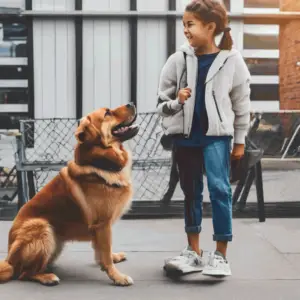Stop dog Barking at Strangers: You’re on your morning walk and Fido starts going nuts, barking at everybody who passes via. It’s embarrassing and traumatic. You’ve attempted announcing yanking on his leash, however, Fido continues freaking out each time he sees a stranger. Don’t worry, you are no longer on my own. Many dogs bark excessively at unexpected human beings, however, the correct information is that this conduct may be corrected with some time and training. In this article, we will explore the reasons why dogs bark at strangers and provide step-by-step instructions to minimize this unwanted behavior. With a bit of staying power and consistency, you can train Fido to preserve calm and quiet around new people very quickly.
Understanding Why Your Dog Barking at Strangers
Dogs bark at strangers for some commonplace reasons. Your dog may additionally sense territorial over your own home or yard and see strangers as intruders. Some puppies bark because of fear or anxiety over new human beings or unusual sights and sounds. Boredom or extra power also can lead to excessive barking for attention.
Territorial Instincts
Many dogs have a strong territorial instinct and will bark at anyone entering an area they consider their own. Your dog views strangers near their territory as a potential threat. While this behavior may have been useful when dogs lived in the wild, for pet dogs it usually just creates noise pollution! Reducing territorial barking involves training your dog to not view strangers as a threat.

Fear and Anxiety
Some dogs suffer from fear and anxiety over new people or situations. Loud noises, physical appearance, or sudden movements by strangers may frighten your dog and trigger barking. It’s important to socialize anxious dogs from an early age, but behavior modification training can also help fearful adult dogs gain confidence. Reassuring your dog during interactions with strangers will help them associate new people with positive experiences.
Boredom and Attention Seeking
Dogs are social creatures and a few bark excessively out of boredom or to get interest from their owners or strangers. While it can seem innocent, it’s essential to keep away from reinforcing this conduct by way of no longer giving your canine interest while they may be barking for it. Instead, reward and reward your dog whilst they are being quiet. Providing interactive canine toys and play can also assist in relieving boredom and discouraging attention in search of barking.
The key to curbing immoderate barking at strangers is determining the underlying reason for your dog’s conduct and enforcing answers to cope with it. With time and consistency, you could teach your dog to forestall barking at strangers.
Teaching Your Dog to Be Calm Around New People
The key to schooling your dog to stop barking at strangers is teaching them to stay calm in the presence of the latest people. This takes patience, exercise, and advantageous reinforcement.
Make introductions on your terms
Have buddies or family individuals come over when you’re home so that you can nicely introduce them to your dog. Keep your dog on a leash at first and feature the new man or woman forget about them till they calm down. Once your dog is quiet, have the new person give them a treat. This helps your dog associate being calm and quiet around new people with getting rewards.
Ask strangers for help
When you’re out walking your dog, ask passersby if they’ll help with a quick training session. Explain that you’re working on teaching your dog to be polite around new people. Have the person ignore your dog until they stop barking, then give it a treat. Thank the person for their help. These real-world training opportunities, paired with treats, will help make a big impact.
Stay calm yourself
Dogs pick up on our emotions and energy. Remain relaxed, confident, and assertive when new people are around. Stay positive and patiently wait for them to stop barking, then reward and praise them. Your calm, controlled energy will help keep your dog feeling secure.
Practice every day
Have friends and family come over as often as possible so you can practice the introduction process. You should additionally take your canine out in public places where there are many opportunities for interactions and rewards from passersby. With normal practice and consistency, your dog will research that being quiet and well-mannered around new humans outcomes in treats, praise, and greater social interplay. In time, you will have a properly-behaved canine that greets new friends lightly and with courtesy.

Using Positive Reinforcement to Stop Barking
One of the kindest approaches to teaching your canine to prevent barking at strangers is through fantastic reinforcement. This approach is worthwhile for your dog while they may be quiet to train them in the behavior you want. One of the kindest approaches to training your dog to forestall barking at strangers is through wonderful reinforcement. This method rewards your dog whilst they are quiet to train them in the behavior you need.
Stay calm and patient
It’s important to remain patient
Reward your dog for being quiet
When a stranger approaches or rings the doorbell and your dog remains quiet, immediately reward them with a treat and praise. Give the treat within 3 seconds of the quiet behavior so your dog associates the reward with being silent. If they start barking, ignore the behavior until they stop.
Use the “Quiet” command
Once your dog has the hang of being quiet for strangers, you can start introducing the verbal cue “Quiet”. When a stranger appears, say “Quiet”, wait for your dog to stop barking, then reward. This helps them learn to associate the command with the proper behavior. Practice this regularly in different situations with different strangers.
Increase the time between treats
Over multiple training sessions, slowly increase the time between when your dog stops barking and when you give the treat. This helps them learn to remain quiet for longer periods before getting a reward. Go from 3 seconds to 5 to 10 and up. If they start barking again, ignore it until they quiet down, then reward.
Provide alternative behaviors
Barking is usually a result of extra power or anxiety. Give your dog suitable outlets for these feelings so they may be less likely to bark at strangers. Before strangers come over, take your canine for a walk or play with them. Puzzle toys and chunk toys can keep them occupied while someone’s at the door.
With consistency and patience, advantageous reinforcement training will help train your canine to live quietly while strangers are around. But recall, some barking is normal – you simply want to educate them to stop while you deliver the command! Staying calm and rewarding the behavior you want to see will move in a protracted manner.
Managing the Environment to Prevent Barking
Controlling your dog’s environment is key to curbing excessive barking at strangers. Pay close attention to triggers that cause your dog to bark and make adjustments.
Limit distractions
Dogs often bark out of excitement or in response to outside noises and activity. Minimize what your dog can see and hear from windows and the yard. Close blinds or curtains to block the view and try to muffle outside sounds with a fan or white noise machine. The less stimuli to provoke your dog, the less likely they are to bark.
Give your dog a safe space
Providing your dog with a space to retreat can help them feel less anxious about outside activities and strangers. Give them access to a crate, room, or gated area they associate with being calm. Having this safe space allows them to self-soothe and avoid feeling trapped in a situation that makes them uncomfortable.
Be patient and consistent
It can take time and practice for your dog to change their behavior. Continue to block triggers and access to stimulation that causes barking, even if it does not seem effective at first. Reward and praise your dog when they remain quiet in situations where they normally bark. Over multiple, consistent training sessions they will learn the behavior you expect.
Avoid punishment
Do not punish or yell at your dog for barking at strangers. This will possibly best lead to more tension and worsen the conduct. Remain calm and redirect your canine’s attention to the precise toy or deal with it alternatively. Only deliver rewards and praise while your dog is quiet and well-behaved. Positive reinforcement of the conduct you need to look at can be lots extra powerful.
With time and consistency, making adjustments to restrict barking triggers and properly educating your canine can assist decrease excessive barking at strangers. Be patient through the method and understand that converting conduct takes repetition and nice reinforcement of suitable conduct. Stay calm and continue to redirect your dog’s attention to rewards for being quiet.
Conclusion
So there you’ve got it – with time, patience, and consistency, you can educate your dog to forestall barking at strangers. It may take a few trials and blunders to discover what motivates your doggy, but the usage of high-quality reinforcement and clear boundaries will get you there. Don’t get discouraged in case your canine does not pick it up right away. Stick with it and very quickly you may have a canine who appears to you when strangers method in preference to sounding the alarm. With the right techniques, you can scale down immoderate barking and help your dog be extra cushy around surprising people. Just recollect that education takes time, so have realistic expectations. But the effort will be worth it for each of you and your 4-legged pal.




One Comment on “How to Stop Your Dog from Barking at Strangers”